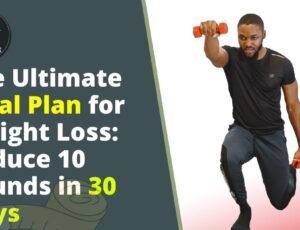
Starting a Weight Loss Journey? Follow This Comprehensive Weight Loss Guide for Beginners

Starting a weight-loss journey can be a daunting endeavor, especially for beginners who are unfamiliar with the process. However, anyone may effectively reach their weight loss goals with the appropriate attitude and a few helpful ideas.
Table of Contents
Introduction
In this comprehensive weight loss guide for beginners, we will look at numerous weight loss tactics as well as crucial components for a weight loss plan for beginners, such as setting realistic goals, developing a nutritious nutrition plan, including exercise, and staying motivated. Individuals can embark on a sustainable path of weight loss that supports their overall well-being by following the right weight loss tips for beginners and avoiding pitfalls.

Setting Realistic Goals
Setting realistic objectives is the first step toward a healthy weight loss process for beginners. Many people are tempted to set lofty goals and anticipate quick results, but it is vital to remember that healthy weight loss is a process that takes time. Setting unrealistic goals frequently results in frustration and disappointment, which can stymie growth. Beginners should instead aim to lose one to two pounds per week, as this is a healthy and sustainable weight loss rate. Although this may appear to be a minor amount, the cumulative effect over time can result in significant weight loss.
Setting Specified, Measurable, Achievable, Relevant, and Time-bound (SMART) goals can boost goal-setting efficacy in weight loss plans for beginners. A SMART objective is one that has a well-defined plan of action. Instead of merely wanting to “lose weight,” a SMART goal may be to “lose 10 pounds within the next eight weeks by following a balanced diet and exercising regularly.” This provides a defined target, a timetable, and a plan of action for a healthy weight loss process for beginners, which increases the likelihood of success.
Making a Nutritional Plan

Diet is a crucial part of weight-loss plans for beginners. A well-balanced, nutrient-dense diet aids in the creation of a calorie deficit and improves general well-being. Beginners should begin by introducing more fruits and vegetables into their meals to build a healthy eating pattern. These natural sources of vitamins, minerals, and fiber supply critical nutrients while keeping calories to a minimum. Fruits and vegetables are also low in calories, making them an excellent choice for weight loss.
In addition to fruits and vegetables, another important weight loss tip for beginners is to include lean protein sources in the diet. Chicken, fish, beans, lentils, and tofu are abundant in protein, which helps build and repair tissues, promotes satiety, and protects muscle mass throughout weight loss. Incorporating lean proteins into meals and snacks might help people feel satiated for longer periods of time, lowering the urge to overeat or reach for harmful snacks.
Another crucial part of a weight loss plan for beginners is to limit processed and high-fat foods in the diet. Processed foods are frequently high in added sugars, harmful fats, and calories. Individuals can establish a calorie deficit and speed weight loss by limiting their consumption of these things. Instead, prioritize complete, unprocessed foods that are high in nutrients and provide consistent energy throughout the day.
Monitoring portion sizes is an effective weight-loss method. When consumed in excess, even nutritious meals can contribute to weight gain. Individuals can become more conscious of acceptable serving sizes and avoid overeating by using measuring cups, a food scale, or other portion control techniques.
Including Exercise in Routine

Regular exercise is essential for a successful weight loss plan for beginners. It aids in calorie burning, muscular building, cardiovascular health, and general well-being. Beginners should aim for 150 minutes of moderate-intensity exercise per week. This advice can be broken down into 30 minutes of exercise five days a week, or it can be changed based on individual tastes and schedules.
Cardiovascular exercises, such as brisk walking, jogging, cycling, or swimming, are beneficial for calorie burning and heart health. These activities raise the heart rate, increase metabolism, and aid in the healthy weight loss process for beginners. Beginners can choose fun activities to make exercise more enjoyable and sustainable. Going on a nature hike, joining a dance class, or engaging in team sports, for example, can all be beneficial types of cardiovascular exercise.
Strength training is also essential for weight loss because it helps build and maintain lean muscle mass. Muscle is more metabolically active than fat, which means it burns more calories even when resting. Individuals can increase their muscle mass and metabolism by incorporating strength training exercises such as weightlifting, bodyweight exercises, or resistance band routines. Aim for at least two to three strength training sessions per week, addressing key muscle groups. This can be done at home, at a gym, or under the supervision of a personal trainer.
Maintaining Motivation

Maintaining motivation throughout the healthy weight loss process for beginners can be difficult, especially when progress appears to be gradual. However, there are several ways that people can stay focused and devoted. Tracking progress by keeping a food diary or tracking exercises is one useful way. This not only keeps people accountable, but it also allows them to track their development over time. Tracking can help you gain useful insights into your eating habits, discover areas for development, and celebrate your accomplishments along the way.
Setting short, attainable goals and rewarding accomplishments can dramatically boost motivation. Instead of focusing entirely on the final weight-loss goal, divide it into smaller milestones. Set a goal, for example, to lose 5 pounds in the first month or to exercise three times per week for a month. Smaller goals are more attainable and create a sense of accomplishment, which boosts motivation.
Involving friends or family members in your weight loss journey can give you vital support and accountability. Working out with a friend or joining a group fitness activity can make training more pleasurable and encourage regularity. Sharing healthy meals or exchanging ideas with individuals with similar goals can also bring inspiration and make the trip more pleasurable.
Staying motivated can be improved by rewarding oneself for reaching milestones while following good weight loss plans for beginners. Celebrate your accomplishments with non-food rewards such as a massage, new gym gear, or a day trip to your favorite area. These incentives act as reminders of progress and add motivation to continue on the weight-loss path.
Note: There might be affiliate links mentioned here. We may receive a commission if you purchase a product through an affiliate link. There is no additional charge for you. Please do your own research before making any online purchases.
Considerations Regarding Weight Loss Supplements

Weight loss supplements might be a tempting alternative for those just starting their weight loss journey. These pills claim to help by increasing metabolism, decreasing hunger, or stimulating fat burning. While some supplements may have potential benefits, newcomers should proceed with care and consider a few essential aspects.
Beginners should learn the foundations of weight loss before choosing weight-loss supplements. It is critical to understand that supplements are not a panacea and should be viewed as a supplement to a good diet and exercise routine. Supplements alone are unlikely to result in long-term weight loss without a foundation of healthy behaviors.
Before introducing any weight-reduction supplement into their routine, beginners should check with a healthcare professional, such as a doctor or registered dietitian. They can provide you with personalized advice, assess your health, and establish whether a supplement is safe and appropriate for you. This is especially crucial if you have any underlying health concerns or take drugs, as some supplements may interfere with them.
To get the most out of the supplement, make sure you follow the manufacturer’s directions. Extending the specified dosage will not necessarily result in faster or better outcomes. Remember that weight reduction supplements should be used in conjunction with a good weight loss plan for beginners that focuses on a well-balanced diet, frequent exercise, and good lifestyle practices.
Remember that weight-reduction supplements should never be used instead of a healthy diet and regular exercise. You can make informed judgments and work toward a healthy weight loss process for beginners by staying informed and modifying your approach.
Common Weight Loss Mistakes

While learning efficient weight reduction tactics is critical, it is also critical to be aware of frequent rookie blunders. Individuals can avoid setbacks and maintain success by avoiding these hazards. Let’s look at some of the most common weight loss blunders
Skipping Meals: Skipping meals may appear to be an efficient approach to minimizing calorie consumption at first, but it frequently leads to increased hunger and cravings. This can lead to overeating and stymie weight-loss efforts. To sustain a healthy metabolism and maintain energy levels throughout the day, it is critical to prioritize regular, balanced meals.
Excessive Calorie Restrictions: Excessive calorie restriction might have a negative impact on overall health. It can cause nutrient shortages, exhaustion, and eventually binge-eating episodes. It is critical to achieve a balance by establishing a moderate calorie deficit that allows for steady weight loss without sacrificing key nutrients.
Relying on Fad Diets: While fad diets promise rapid results, they are frequently unsustainable in the long run. These diets frequently remove entire food groups or significantly restrict calorie intake, making them difficult to follow over time. Instead of focusing on quick fixes, newcomers should focus on developing a balanced, nutrient-dense eating routine that can be maintained for a lifetime.
Skipping Strength Training: While cardiovascular activity is necessary for weight loss, skipping strength training might result in muscle loss. As previously said, muscle is metabolically active and aids in metabolism. Individuals can preserve and grow muscle mass by including strength training routines into their program, resulting in more successful and sustained weight loss.
Calories Burned Overestimation: It is normal for people to overestimate the quantity of calories burned during exercise. This can lead to a mistaken sense of entitlement to calorie-dense foods, resulting in a calorie excess overall. To avoid making this error, beginners should focus on consistent exercise and eating a balanced diet rather than relying only on exercise to compensate for excessive food consumption.
FAQs
What is a reasonable weight loss rate for beginners?
For beginners, a reasonable rate of weight loss is one to two pounds per week. When compared to rapid weight loss approaches, this slow approach is healthier and more sustainable.
How can I set attainable weight-loss goals?
The SMART principle is advised for setting a good weight loss plan for beginners. Setting defined, quantifiable, realistic, relevant, and time-bound goals is essential. For example, you could aim to lose 10 pounds in eight weeks by eating a balanced diet and exercising regularly.
How can I prepare a healthy diet for weight loss?
A healthy diet plan includes more fruits and vegetables, lean protein sources, and whole, unprocessed foods. Portion control is essential, as is limiting processed and high-fat foods. A consultation with a certified dietician can provide tailored advice.
What kinds of exercises should beginners incorporate into their weight-loss regimen?
Beginners should incorporate a blend of cardiovascular and strength training routines. Cardiovascular exercises such as brisk walking, jogging, cycling, or swimming burn calories while also improving heart health. Weightlifting and bodyweight exercises, for example, help build and maintain lean muscle mass, which enhances metabolism.
How can I keep motivated while losing weight?
Maintaining a food journal or logging exercises can assist with accountability and motivation. Setting small, attainable goals and rewarding accomplishments along the way can help boost motivation. Involving friends or family members, as well as rewarding oneself with non-food rewards, can provide extra support and encouragement.
Why is it critical not to skip meals?
Skipping meals can cause increased hunger and cravings, which can lead to overeating and stymie weight loss efforts. Regular, balanced meals help to maintain a healthy metabolism and energy levels throughout the day.
Is it necessary to severely restrict calorie consumption in order to lose weight?
Calorie restriction can have a negative impact on overall health. It can cause nutrient shortages, tiredness, and binge eating episodes. It is critical to have a reasonable calorie deficit that promotes steady weight loss without jeopardizing key nutrients.
Are Fad diets beneficial for long-term weight loss?
Fad diets may promise rapid results, but they are frequently unsustainable over time. These diets frequently remove entire food groups or significantly restrict calorie intake, making them difficult to follow over time. Instead, concentrate on developing a nutrient-dense eating pattern that can be maintained for a lifetime.
Why is weight loss aided by strength training?
While aerobic exercise is essential for weight management, skipping out on strength training might result in muscle loss. Strength training promotes the development and maintenance of lean muscle mass, which is metabolically active and aids in metabolism. It helps with successful and long-term weight loss.
How can novices avoid overestimating the number of calories burned when exercising?
Individuals frequently overestimate the quantity of calories burned during exercise. To avoid making this error, it is best to focus on frequent exercise and a balanced diet rather than relying only on exercise to compensate for excessive food intake. During workouts, a heart rate monitor or fitness tracker can provide more precise estimates of calorie expenditure.
Conclusion
Beginning a weight loss journey as a beginner can be difficult, but with the appropriate weight loss tips for beginners, it is fully possible. Individuals can experience sustainable weight loss and enhance their overall well-being by setting realistic objectives, developing a nutritious nutrition plan, including regular exercise, and remaining motivated.
It is critical to remember that healthy weight loss is a slow process that requires commitment and perseverance. Avoiding common weight reduction blunders, such as skipping meals or reducing calories excessively, can help you make considerable progress. To ensure safety and effectiveness, it is always best to contact a healthcare physician before beginning any weight loss program.
Beginners can effectively reach their weight loss goals and embrace a healthy lifestyle by following this article as a weight loss guide for beginners and seeking professional counsel. Remember that building durable habits and making gradual changes are the keys to long-term success. Anyone may embark on a successful weight reduction journey and reap the rewards of increased health and well-being by adopting a positive mindset, remaining persistent, and recognizing milestones along the way.
Disclaimer: The information provided in this article is for educational purposes only and should not be considered as a substitute for medical advice. Consult a healthcare professional before implementing any home remedies or making significant changes to your lifestyle.






